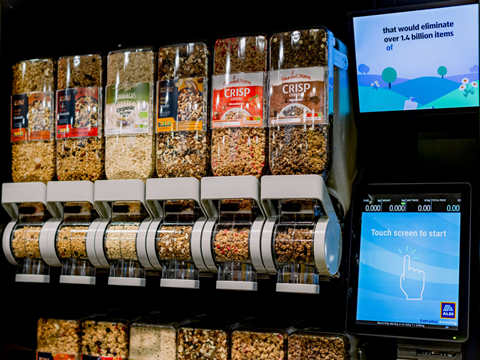
Refillable packaging trials run by Aldi and Ocado under GoUnpackaged’s Refill Coalition achieved in-store refill rates of up to 57%, while 86% of vessels were returned without deposit incentives – with refillables reportedly exceeding the environmental performance of single-use in only two cycles.
In-store refill stations were tested in Aldi’s Solihull and Leamington Spa stores over sixteen months, integrating modular refill ‘vessels’ into existing supply chains; these were expected to replace up to 24 single-use plastic packs per vessel.
At the same time, Ocado sold consumer returnables on its online store over eight months to date. Consumers would receive and return pre-filled reuse containers in their regular grocery deliveries, which was set to replace up to five single-use plastic packs.
According to the findings, in-store refills peaked at 57% and sales share averaged 30%. Online reuse products reportedly reached a high of 43% weekly sales share and averaged 16%.
Consumer satisfaction was reported to be strong; 97% of consumers found the refill system hygienic, and 89% thought it was easy to use.
The model was said to fit ‘seamlessly’ into Aldi’s existing logistics and achieve vessel return rates of 86% without deposit incentives. Staff said they found it easy and quick to restock refill stations.
100% of Ocado users said the packaging they received was clean. Products received consistent ratings of 4.8 and 4.9 stars, and 96% of consumers said they would buy the packaging again.
Additionally, an independent Life Cycle Analysis (LCA) indicates that the reusable vessels offer a better environmental performance than single-use in just two reuse cycles, cutting down on both packaging waste and carbon footprint without impacting operations.
The Refill Coalition believes its trial has proven that scalable and commercially viable reuse systems are ready to go mainstream. It also suggests that market competitors can join forces to drive innovation, share costs, and lower risks.
“We are extremely proud of our collective work to design and launch these new refill and reuse systems, which form a key part of the solution to tackling the single-use plastics crisis,” the Coalition says. “The trial demonstrates the solutions’ operational efficiency, clear environmental benefit and scalability which are critical steps towards industry transformation.
“Additionally, the sales share and in-depth research provide evidence of the significant consumer appetite for refill and reuse as part of their regular shop. We look forward to seeing other retailers and brands taking up these proven solutions, enabling an acceleration towards a reuse future.
Marks & Spencer, Morrisons, Waitrose & Partners, Sainsbury’s, and Lidl are also credited for their contribution in the project’s early stages.
Aldi was also named a finalist in last year’s Sustainability Awards for its in-store reuse trial.
Both the Aldi and Ocado projects were funded by Innovate UK’s Smart Sustainable Plastic Packaging Challenge. When Aldi ended its refill pilot on 11th March, it clarified that funding had come to an end and a limited run was always the plan; yet the in-store solution could not scale could not scale up due to “a lack of wider retailer adoption”, The Grocer reported.
Other reuse pilots are being conducted by Unilever at supermarkets and local markets across Bangladesh, Sri Lanka, and Indonesia. Its collaborations with Vega Innovations, Bopinc, Alner, and others sought to provide consumers with convenient systems that cut down on flexible plastics sachets while giving users more control over product quantity and price.
If you liked this story, you might also enjoy:
The ultimate guide to the Packaging and Packaging Waste Regulation in 2025
How are the top brands progressing on packaging sustainability?
Everything you need to know about global packaging sustainability regulation in 2025
The key to increasing the use of reusable packaging in supermarkets













No comments yet